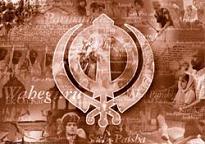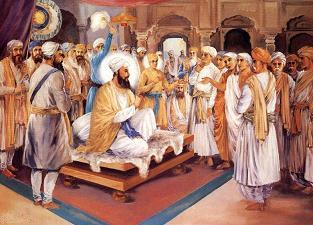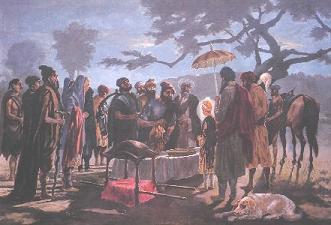
 |
Sikh Missionary Society U.K. (Regd)
10, Featherstone Road.
Southall, Middx, U.K. UB2 5AA
Tel: +44 020 8574
1902
Fax: +44 020 8574
1912
Reg Charity No: 262404
|
||
|---|---|---|---|
|
|
|||
A Noble Sacrifice
"Dying is a privilege for brave men,Gobind Rai was passing his days very happily at Patna when at last his mother received a letter front Guru Tegh Bahadur asking the family to leave Patna and come to Anand Pur in the Punjab. The city of Anand Pur was founded by Guru Tegh Bahadur himself on the land bought by him from the hill chiefs. Gobind Rai's friends and admirers were very sad but he said, "Don't be sad, my friends, there is a great purpose in my departing. Remember me when you look at my bed which I am leaving behind." Everybody was in tears when the family left Patna.
provided they die for a good cause."
(Guru Nanak)
On the way at Dina Pur, an old woman disciple served Kichhori (boiled lentils) to the party and lovingly asked Gobind Rai, "When shall I see your moon-like face again?"
"Good mother," said Gobind Rai, "You will see me every time you serve your kichhori to the poor and the hungry."
The old lady carried on serving kichhoris all through her life and even to this day visitors to that place are served with kichhoris. There stands a temple built in memory of this incident.
On the way the party passed through many towns and Gobind Rai was liked and admired by all, whether they were Hindus or Muslims. At last the family having travelled about 1,000 miles, reached Anand Pur. People welcomed them and there was great joy all over the town. People from all parts of the town came to see young Gobind Rai and brought valuable presents.
Gobind Rai loved to go out hunting and organising mock - fights. He gathered round him many more playmates and this new place was also full of gaiety and laughter.
Soon after his arrival, arrangements were made for his studies. He had learnt Hindi and Sanskrit while at Patna. Now he started learning Punjabi from a scholar, Sahib Chand, and Persian from Qazi Pir Mohammad. A Rajput warrior was employed to train him in military skills and horse riding. He was well trained for some impending struggle so that when the call calve to fight he would not be found wanting. He learnt everything quickly and grasped the philosophy of the Holy Granth. He read a lot of Persian and Sanskrit literature, Hindi epics and some good books of history. He was so keen that he could recite many poems from memory.
 Things
went on like this for a few years till Emperor Aurangzeb became more and
more fierce in converting the non-Muslims to Islam. Nearly half the people
of Kashmir were forced to become Muslims. About 500 Brahmans, led by Kirpa
Ram of Matton (Kashmir), fled from Kashmir and sought the protection of
Guru Tegh Bahadur. In a big gathering at the Guru's Durbar (court) they
told their sad tales: How Aurangzeb had offered them the choice between
Islam and death. Their wives and daughters were taken away from theme their
houses plundered and burnt. How they were forced to eat beef (strictly
forbidden to the Hindus by religion). The Guru was thinking deeply when
nine-year-old Gobind Rai saw him and asked, "What makes you so thoughtful,
dear father?"
Things
went on like this for a few years till Emperor Aurangzeb became more and
more fierce in converting the non-Muslims to Islam. Nearly half the people
of Kashmir were forced to become Muslims. About 500 Brahmans, led by Kirpa
Ram of Matton (Kashmir), fled from Kashmir and sought the protection of
Guru Tegh Bahadur. In a big gathering at the Guru's Durbar (court) they
told their sad tales: How Aurangzeb had offered them the choice between
Islam and death. Their wives and daughters were taken away from theme their
houses plundered and burnt. How they were forced to eat beef (strictly
forbidden to the Hindus by religion). The Guru was thinking deeply when
nine-year-old Gobind Rai saw him and asked, "What makes you so thoughtful,
dear father?"
"The Emperor of India," said Guru Tegh Bahadur, "has lost his senses and only a noble sacrifice can stein the tide of his tyranny and cruelty. I am wondering whose blood can inject courage and fearlessness into the Indian people?"
"Who else has a nobler or richer blood than you, dear father'?" asked
Gobind Rai. "It is you who wrote "If you lend a helping hand, do not forsake
it even if you have to sacrifice yourself." I would rather be fatherless
than see innocent millions being butchered in cold blood." Everybody was
surprised at Young Gobind Rai's words. Soon after, the Guru went away to
Delhi to discuss the matter with the Emperor and to ask him to change his
policy towards the non-Muslims. The Guru tried to convince him that the
way the Emperor had chosen was evil and dangerous. The Emperor only offered
the Guru the usual choice of Islam or death. The Guru chose to die and
was beheaded at Chandni Chawk, Delhi in 1675. One of the Guru's followers,
Bhai Dyala, was boiled to death in a cauldron and another, Bhai Matti Dass,
was sawn in two while still alive. The Emperor ordered that the dead body
of the Guru must not be allowed to be taken away from the public square
as a warning to others who stood against the policies of the Government.
The effect of this was so depressing that people were too frightened to
fight for their faith and country. No Sikh came forward to declare his
faith and many even said they were not followers of the Guru.  However,
a brave Sikh, Bhai Jeewan, risked his life and daringly removed the Guru's
head and hurried in secret to Anand Pur. He placed the head before young
Gobind Rai and narrated the story of the fear and cowardice among the Guru's
followers. Hearing him, Gobind Rai declared "Wait and see, I will make
such followers as will not be able to hide themselves but will declare
their faith openly. As for courage,
However,
a brave Sikh, Bhai Jeewan, risked his life and daringly removed the Guru's
head and hurried in secret to Anand Pur. He placed the head before young
Gobind Rai and narrated the story of the fear and cowardice among the Guru's
followers. Hearing him, Gobind Rai declared "Wait and see, I will make
such followers as will not be able to hide themselves but will declare
their faith openly. As for courage,
"I will make sparrows hunt down hawks;Immediately after the martyrdom of Guru Tegh Bahadur Gobind Rai was proclaimed the next Guru. The shocked Sikhs were furious and talked of avenging themselves on the tyrant Aurangzeb. The tenth Guru was seemingly calm. For him revenge seemed too small. His mind was set on something greater. His father's death had served its purpose. It had demonstrated that the tyrannous and cruel rulers will not understand the language of love. For honourable life it was necessary to tight evil and people had to be hardened to fight against tyranny. The path of reconciliation had been tried. It was not appreciated.
I will turn jackals into fierce lions;
And make one single Sikh fight a legion."
So the Guru began to teach his followers both religion and the ways of making war. He held big meetings to prepare the people for the great task. After the morning prayer, he held a daily court. The bards sang the epics of brave men, and the poets translated stories of the brave deeds of Rama, Krishna and other heroes from Sanskrit into simple Hindi and Punjabi verse. He did all he could to inspire his Sikhs to be ready to fight for the right cause. The Guru's own writings elevated the spirit of the people and made them forget all their social differences to unite in the common national cause. Arms, ammunition and horses were made available in large quantities. Wrestling, racing, archery and other activities involving risk and skill were practised daily. All the Guru's followers were asked to bring offerings of horses and weapons. The Guru's army drilled every day to the beat of Ranjit Nagara (a big war drum). A trader named Duni Chand brought a splendid gilded tent from Kabul and the ruler of Assam offered the Guru an elephant named "Parsadi" among other very valuable gifts. The popularity of time Guru grew day by day. It caused an irritation to the neighbouring hill chiefs as well as to the Emperor of Delhi
Text of the secret report sent to the Emperor -
"Gobind declares himself to be Guru Nanak. Faujdar to
prevent him from assembling his Sikhs."
(Akhbarat-e-Darbar-e Muallah Sirhind November 20, 1693)
| Previous Chapter - Bala Pritham |
Next Chapter - The
Battle of Bhangani
|